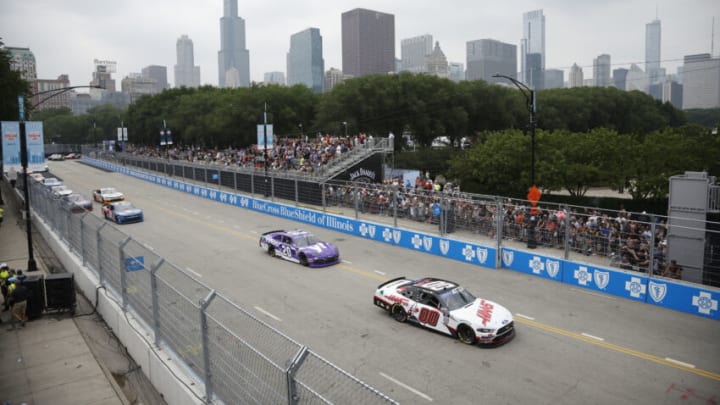NASCAR decided to end the Xfinity Series race before the required lap on Sunday, but they were technically allowed to do it.
On Saturday, NASCAR attempted to run the first ever race at the brand-new Chicago Street Course, with The Loop 121 Xfinity Series race scheduled to take place at the temporary street circuit.
The 55-lap race around the 12-turn, 2.2-mile (3.541-kilometer) Chicago, Illinois course did get underway as scheduled, but only 25 laps had been run when the race was ultimately postponed until Sunday morning due to lightning.
The reason why the race could not be ended after lap 25 is because NASCAR requires races to reach the earlier of the halfway point or the end of stage two in order to be considered official.
With stage two set to end after lap 30, this meant that 28 laps needed to be run. Saturday’s race came up three laps shy of that mark, forcing it to be postponed instead of simply ended.
But when Sunday rolled around and the conditions would not allow for the race to continue, NASCAR ended it anyway.
While the halfway/stage two condition was not met, NASCAR was still allowed to make this decision. Stewart-Haas Racing’s Cole Custer, who was leading when the race was halted on Saturday, was declared the race winner.
Here are the “except in rare instances” — known as EIRI — rules in the rulebook that pretty much lets NASCAR make any decision like ending the race short of halfway and calling it official. pic.twitter.com/Is0JbUjvW2
— Bob Pockrass (@bobpockrass) July 2, 2023
Sunday’s Cup Series race ended up being shortened from 100 laps to 75 laps (78 with overtime), but that was never controversial. The race, which initially had its start time moved up by nearly an hour, was delayed due to bad weather, and it needed to be ended early due to darkness.
While the course does have street lights, those lights are not designed for NASCAR racing at night like the lights at the majority of the oval tracks on the schedule.
Shane van Gisbergen became the first driver to win his Cup Series debut since 1963, driving the No. 91 Chevrolet to victory lane for Trackhouse Racing Team in just the third appearance of PROJECT91.
